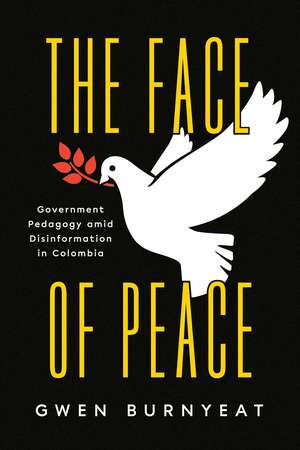The Face of Peace: Government Pedagogy amid Disinformation in Colombia
Autor Gwen Burnyeaten Limba Engleză Paperback – 8 sep 2022
Colombia’s 2016 peace agreement with the FARC guerrillas sought to end fifty years of war and won President Juan Manuel Santos the Nobel Peace Prize. Yet Colombian society rejected it in a polarizing referendum, amid an emotive disinformation campaign. Gwen Burnyeat joined the Office of the High Commissioner for Peace, the government institution responsible for peace negotiations, to observe and participate in an innovative “peace pedagogy” strategy to explain the agreement to Colombian society. Burnyeat’s multi-scale ethnography reveals the challenges government officials experienced communicating with skeptical audiences and translating the peace process for public opinion. She argues that the fatal flaw in the peace process lay in government-society relations, enmeshed in culturally liberal logics and shaped by the politics of international donors. The Face of Peace offers the Colombian case as a mirror to the global crisis of liberalism, shattering the fantasy of rationality that haunts liberal responses to “post-truth” politics.
| Toate formatele și edițiile | Preț | Express |
|---|---|---|
| Paperback (1) | 215.55 lei 3-5 săpt. | +16.57 lei 6-12 zile |
| University of Chicago Press – 8 sep 2022 | 215.55 lei 3-5 săpt. | +16.57 lei 6-12 zile |
| Hardback (1) | 586.88 lei 3-5 săpt. | +26.81 lei 6-12 zile |
| University of Chicago Press – 22 sep 2022 | 586.88 lei 3-5 săpt. | +26.81 lei 6-12 zile |
Preț: 215.55 lei
Nou
Puncte Express: 323
Preț estimativ în valută:
41.25€ • 42.74$ • 34.43£
41.25€ • 42.74$ • 34.43£
Carte disponibilă
Livrare economică 28 februarie-14 martie
Livrare express 13-19 februarie pentru 26.56 lei
Preluare comenzi: 021 569.72.76
Specificații
ISBN-13: 9780226821627
ISBN-10: 0226821625
Pagini: 320
Ilustrații: 10 halftones, 1 tables
Dimensiuni: 152 x 229 x 23 mm
Greutate: 0.43 kg
Ediția:First Edition
Editura: University of Chicago Press
Colecția University of Chicago Press
ISBN-10: 0226821625
Pagini: 320
Ilustrații: 10 halftones, 1 tables
Dimensiuni: 152 x 229 x 23 mm
Greutate: 0.43 kg
Ediția:First Edition
Editura: University of Chicago Press
Colecția University of Chicago Press
Notă biografică
Gwen Burnyeat is a junior research fellow in anthropology at Merton College, University of Oxford. She is the author of Chocolate, Politics, and Peace-Building.
Cuprins
Note on Translation
List of Abbreviations
Prologue
Introduction
Part I Anthrohistory of the Santos Government
1 Peace, Politics, and Public Opinion under Juan Manuel Santos, 2010–2018
2 The Rationality Drive: The Development of Government Peace Pedagogy, 2012–2018
3 The Anti-politics of Cultural Liberalism
Part II Ethnography of Peace Pedagogy in Action
4 Interface: The Enactment of Legitimacy by Explanation
5 State-Consciousness: Three Layers of Responsibility and Trust
6 Rendering Political: The Affective Labor of Liaising with the FARC et al.
7 The Entangled Face: International Implication in Government Responsibility
Conclusion
Acknowledgments
Notes
References
Index
List of Abbreviations
Prologue
Introduction
Part I Anthrohistory of the Santos Government
1 Peace, Politics, and Public Opinion under Juan Manuel Santos, 2010–2018
2 The Rationality Drive: The Development of Government Peace Pedagogy, 2012–2018
3 The Anti-politics of Cultural Liberalism
Part II Ethnography of Peace Pedagogy in Action
4 Interface: The Enactment of Legitimacy by Explanation
5 State-Consciousness: Three Layers of Responsibility and Trust
6 Rendering Political: The Affective Labor of Liaising with the FARC et al.
7 The Entangled Face: International Implication in Government Responsibility
Conclusion
Acknowledgments
Notes
References
Index
Recenzii
“This remarkable book combines sensitive ethnography, brave and imaginative analysis, and considerable passion to tell a story for our times about the failures of liberal peace-making in Colombia and the seemingly unbridgeable divide between the state and ordinary people. Its brilliant analysis of liberalism’s limitations provides sparks of hope for a more humane political future.”
“This brilliant first-of-its-kind anthropological study of peace pedagogy draws lessons for lasting peace even in deeply polarized societies such as Colombia. It is highly recommended to those familiar with Colombia’s peace process and those considering how to adopt effective peace processes in other countries.”
“A riveting inside story of the interface between government and the public with an extraordinary breadth of empirical data and a rich resource of lessons learned about countering disinformation. A must-read for all who seek to build better, more holistic narratives of peace in the current context of toxic polarization.”
"Burnyeat emphasizes the concept of 'cultural liberalism'as a descriptor for the government’s approach to politics and many of those working for peace. . . The work is informed not only by the results of the plebiscite but by how the regime of President Duque weakened the peace agreement and the promises it contained. . . Recommended."
